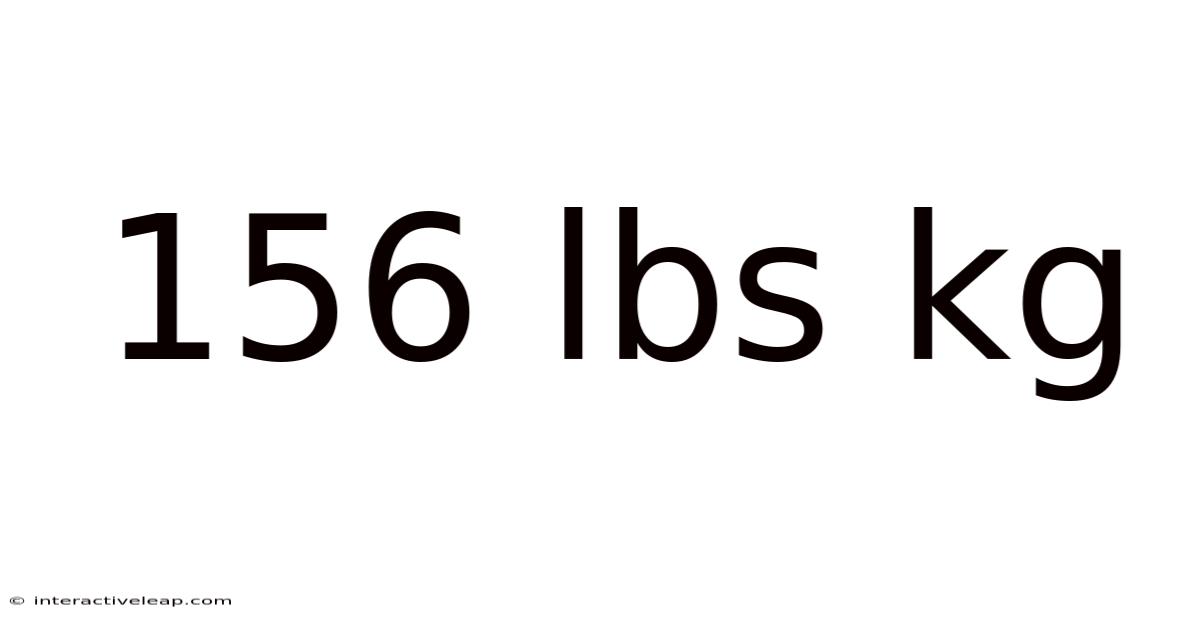156 Lbs Kg
interactiveleap
Sep 25, 2025 · 5 min read

Table of Contents
156 lbs to kg: Understanding Weight Conversions and Their Significance
Knowing how to convert units of measurement is a fundamental skill with applications spanning various fields, from everyday life to scientific research. This comprehensive guide delves into the conversion of 156 pounds (lbs) to kilograms (kg), exploring the underlying principles, practical applications, and the broader significance of understanding weight conversions. We'll cover the calculation, discuss why this conversion is important, and address frequently asked questions about weight and unit conversions.
Understanding the Conversion Factor
The conversion between pounds (lbs) and kilograms (kg) is a crucial aspect of the international system of units (SI). The fundamental relationship is that 1 kilogram is approximately equal to 2.20462 pounds. This means that to convert pounds to kilograms, we divide the weight in pounds by this conversion factor. Conversely, to convert kilograms to pounds, we multiply the weight in kilograms by this factor.
Calculating 156 lbs to kg
To convert 156 lbs to kilograms, we utilize the conversion factor:
1 kg ≈ 2.20462 lbs
Therefore, to find the equivalent weight in kilograms, we perform the following calculation:
156 lbs / 2.20462 lbs/kg ≈ 70.76 kg
Therefore, 156 lbs is approximately equal to 70.76 kg.
Practical Applications of Weight Conversions
The ability to convert between pounds and kilograms is essential in numerous situations:
-
International Trade and Commerce: Global trade necessitates accurate weight conversions for shipping, pricing, and regulatory compliance. Products are often labeled in both lbs and kg to cater to international markets.
-
Healthcare and Medicine: Doctors and healthcare professionals often need to convert weights between different units for accurate dosage calculations, patient monitoring, and health assessments. International health guidelines often use kg as the standard unit for weight.
-
Scientific Research: In scientific research, particularly in fields like physics, chemistry, and engineering, accurate unit conversions are crucial for ensuring consistency and replicability of experiments.
-
Fitness and Nutrition: Many fitness trackers and nutrition apps allow users to input their weight in either lbs or kg. Understanding the conversion allows for accurate tracking and goal setting.
-
Travel and Transportation: Luggage weight restrictions on airlines and other modes of transportation are often specified in both pounds and kilograms.
-
Cooking and Baking: Recipes originating from different countries may use different units for ingredients. Converting weights ensures accurate measurements.
The Significance of Understanding Unit Conversions
Beyond the practical applications, understanding unit conversions is crucial for developing a broader appreciation for the international system of units (SI) and the importance of standardization. Using a consistent system simplifies communication, minimizes errors, and fosters collaboration across different disciplines and geographical locations.
Beyond the Conversion: Factors Affecting Weight
While the conversion itself is straightforward, it's important to acknowledge that weight can be influenced by several factors:
-
Gravity: Weight is a measure of the force of gravity acting on an object's mass. Therefore, weight varies slightly depending on location due to variations in gravitational pull. For instance, you would weigh slightly less on a mountain than at sea level.
-
Mass vs. Weight: It's crucial to differentiate between mass and weight. Mass is the amount of matter in an object and remains constant regardless of location. Weight, on the other hand, is the force of gravity acting on that mass and changes with variations in gravity. The conversion we've performed deals with weight, not mass.
-
Fluid Displacement: The apparent weight of an object can be affected by buoyancy when submerged in a fluid. The object appears lighter due to the upward force of the fluid.
-
Instrumentation: The accuracy of the weight measurement depends on the precision of the weighing instrument used.
Frequently Asked Questions (FAQs)
Q1: What is the exact conversion factor from lbs to kg?
A1: The exact conversion factor is 0.453592 kg per pound. We used an approximation of 2.20462 lbs/kg for simplicity, but for higher precision, the exact factor should be used.
Q2: Can I use online converters to perform this conversion?
A2: Yes, many reliable online converters are available to perform lb to kg and kg to lb conversions quickly and accurately. Always double-check the results using the conversion factor to ensure accuracy.
Q3: Why are both pounds and kilograms used?
A3: Both pounds and kilograms are used due to historical reasons and regional preferences. The pound is a traditional unit of weight in many countries, while the kilogram is the standard unit of mass in the SI system and is predominantly used in scientific and international contexts.
Q4: What are some other common unit conversions involving weight?
A4: Other common weight conversions include ounces to grams, tons to kilograms, and stones to kilograms. The principles of conversion remain the same—understanding the conversion factor is key.
Q5: Is it always necessary to convert units?
A5: It's not always strictly necessary, depending on the context. However, consistent use of units within a specific application or project enhances clarity, reduces errors, and allows for seamless collaboration.
Conclusion: Mastering Unit Conversions
Converting 156 lbs to kg, while seemingly a simple calculation, highlights the importance of understanding unit conversions in various aspects of our lives. The ability to accurately convert between different units of measurement not only simplifies everyday tasks but also plays a crucial role in scientific research, international commerce, and healthcare. By mastering these fundamental skills, we foster clear communication, accuracy, and a deeper appreciation for the standardization of measurement systems. Remember that while the conversion itself is straightforward, understanding the concepts of mass versus weight and the factors that can influence weight measurements provide a more complete understanding of this essential skill.
Latest Posts
Related Post
Thank you for visiting our website which covers about 156 Lbs Kg . We hope the information provided has been useful to you. Feel free to contact us if you have any questions or need further assistance. See you next time and don't miss to bookmark.